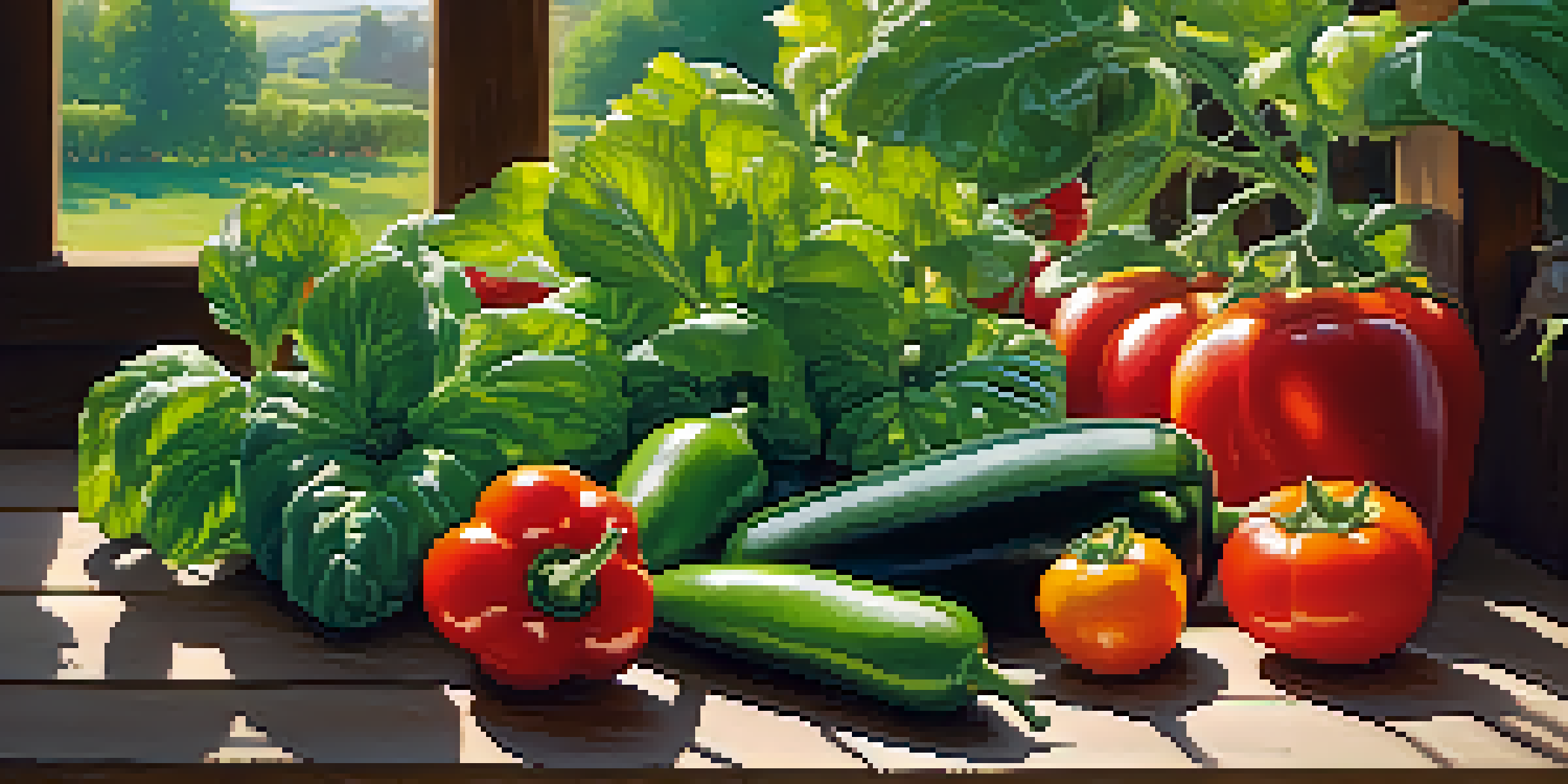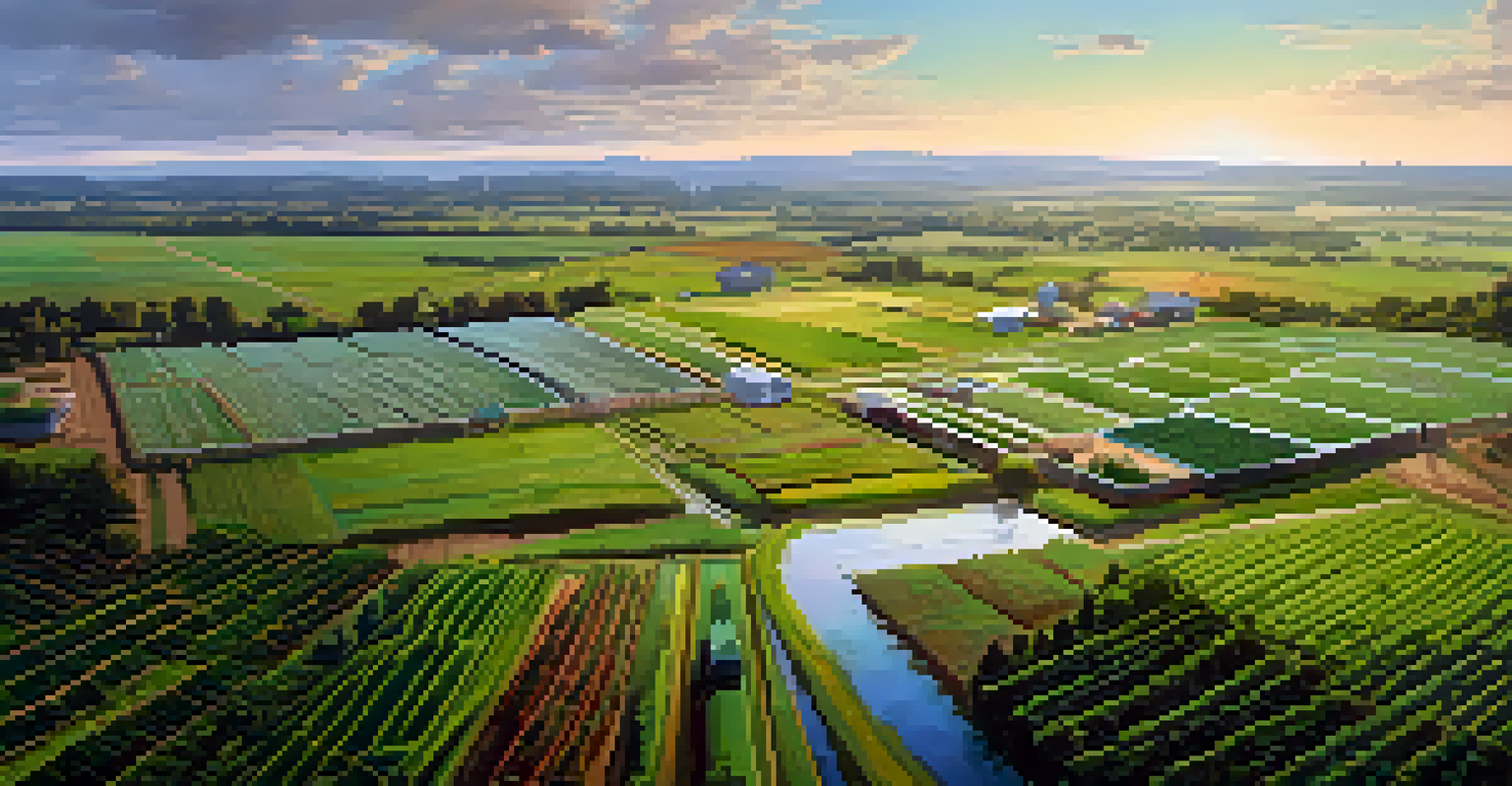Sustainable Agriculture: The Connection with Vegan Food Choices

Understanding Sustainable Agriculture and Its Importance
Sustainable agriculture focuses on farming practices that meet current food needs without compromising future generations. It emphasizes environmental health, economic profitability, and social equity. By nurturing the land and using resources efficiently, sustainable agriculture aims to create a balanced ecosystem.
Sustainable agriculture is a way of farming that meets the needs of the present without compromising the ability of future generations to meet their own needs.
This approach not only supports biodiversity but also reduces pollution and conserves water. For instance, crop rotation and organic farming methods enhance soil fertility and lower dependency on chemical fertilizers. In essence, sustainable agriculture fosters a healthier planet for all life forms.
Moreover, it plays a crucial role in addressing global issues like climate change and food insecurity. By prioritizing sustainable methods, we can produce food in a way that protects our natural resources, ensuring that future generations can also enjoy a stable food supply.
The Rise of Veganism: A Shift Towards Plant-Based Diets
Veganism is more than just a dietary choice; it's a lifestyle that seeks to minimize harm to animals and the environment. With a growing awareness of the impacts of animal farming on climate change, many are turning to plant-based diets. This shift is fueled by both ethical considerations and health benefits associated with consuming more fruits and vegetables.

In fact, studies show that adopting a vegan diet can significantly reduce one's carbon footprint. Plant-based foods generally require less energy and water to produce compared to animal products. As a result, the rising popularity of veganism aligns closely with sustainable agriculture goals.
Sustainable Agriculture Benefits All
Sustainable agriculture nurtures the environment while ensuring food security for future generations.
By choosing vegan options, individuals can contribute to a more sustainable food system. It's a powerful way to express values centered around compassion, sustainability, and health while enjoying a delicious variety of foods.
How Vegan Food Choices Promote Sustainable Farming
Choosing vegan food options directly supports sustainable agriculture by reducing the demand for resource-intensive animal products. Livestock farming requires vast amounts of land, water, and feed, which can lead to deforestation and habitat loss. By opting for plant-based meals, consumers can help alleviate the pressure on these vital resources.
You don't have to be vegan to be aware of the environmental impact of your food choices.
Additionally, many plant-based foods can be grown in diverse climates and conditions, promoting agricultural resilience. Crops like legumes and grains can enrich the soil and improve its health, enhancing biodiversity. This not only benefits the environment but also boosts food security for communities.
Moreover, supporting local vegan farms fosters community-based agriculture. By purchasing from these sources, consumers can help ensure that sustainable practices are prioritized, leading to a more equitable food system that benefits both producers and consumers alike.
The Environmental Impact of Animal Agriculture
Animal agriculture is one of the leading contributors to greenhouse gas emissions, deforestation, and water pollution. Livestock farming generates significant methane emissions, a potent greenhouse gas that exacerbates climate change. Moreover, the extensive land required for grazing and feed crops often results in habitat destruction.
In addition, animal waste can contaminate local water supplies, leading to serious ecological issues. Nutrient runoff from farms can create harmful algal blooms, disrupting aquatic ecosystems. As a result, reducing meat and dairy consumption is crucial for mitigating these environmental impacts.
Veganism Supports Eco-Friendly Choices
Adopting a vegan diet reduces the demand for resource-intensive animal products, promoting a greener food system.
Transitioning to a plant-based diet offers a practical solution to these pressing problems. By making conscious food choices, we can collectively work towards a healthier planet and a more sustainable future.
Benefits of Organic Vegan Farming Practices
Organic vegan farming practices emphasize the use of natural inputs and methods to cultivate crops. This approach avoids synthetic pesticides and fertilizers, which can harm the environment and human health. Instead, organic farmers rely on techniques like crop rotation, composting, and natural pest control to maintain soil health and productivity.
By prioritizing organic methods, vegan farming promotes biodiversity and enhances ecosystem resilience. Healthy soil is crucial for growing nutritious crops, and organic practices contribute to its vitality. For example, adding organic matter through compost improves soil structure, enhancing its ability to retain moisture and nutrients.
Furthermore, organic vegan farms often support local economies by selling directly to consumers. This connection fosters community relationships and encourages sustainable practices, creating a positive feedback loop that benefits everyone involved.
Veganism's Role in Reducing Food Waste
Food waste is a significant issue globally, with nearly one-third of all food produced going uneaten. When we waste food, we not only waste the resources used to grow it but also contribute to greenhouse gas emissions as it decomposes in landfills. Adopting a vegan diet can help minimize food waste through more mindful consumption.
Plant-based foods often have longer shelf lives compared to meat and dairy products, making them less prone to spoilage. Additionally, by prioritizing whole foods, vegetarians and vegans can create meals that utilize ingredients fully, reducing leftovers and waste. For instance, using vegetable scraps for broths or compost can enhance sustainability.
Reducing Food Waste Through Veganism
A plant-based diet encourages mindful consumption and less food waste, benefiting both the environment and communities.
Moreover, supporting local vegan initiatives that focus on reducing food waste can amplify this impact. Many organizations work to redistribute excess food to those in need, embodying the principles of sustainability and community support.
The Future of Food: Integrating Veganism and Sustainability
As we look ahead, the integration of veganism and sustainable practices is more important than ever. The global population is expected to rise, leading to increased pressure on our food systems. By embracing plant-based diets and innovative farming methods, we can create a more resilient food landscape.
Technological advancements are also helping to bridge this gap. From lab-grown meat alternatives to vertical farming, new solutions are emerging to make food production more efficient and sustainable. These innovations can complement vegan practices, offering diverse options for consumers without compromising the environment.

Ultimately, the future of food hinges on our collective choices. By supporting sustainable agriculture and embracing veganism, we can steer our food systems towards a more environmentally friendly and equitable future.